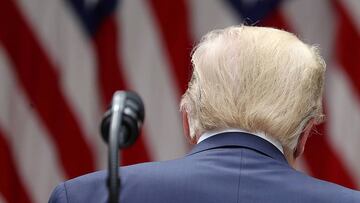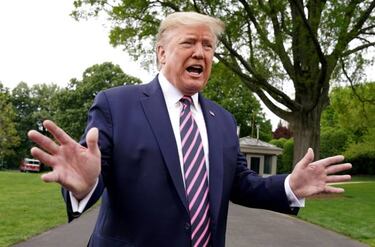Coronavirus Trump: Why is Donald Trump considered a high risk patient?
U.S. President Donald Trump was taken to a military hospital on Saturday for treatment after testing positive for Covid-19, a month before the Nov. 3 presidential election.

U.S. President Donald Trump was moved to a military hospital on Saturday for treatment after testing positive for Covid-19, an extraordinary development that upended the presidential race a month before the Nov. 3 election.
-
Donald Trump, transferred to a military hospital as a "preventive measure" after his positive
-
Trump Covid-19 positive: who is Hope Hicks, the aide thought to have infected the president?
Roughly 17 hours after he made his diagnosis public, Trump walked slowly from the White House to a waiting helicopter to be taken to Walter Reed National Military Medical Center in Bethesda, Maryland. He wore a mask and business suit and did not speak to reporters.
"I think I'm doing very well, but we're going to make sure that things work out," Trump said in a brief video message posted on Twitter. Early on Friday, he had tweeted that he and the first lady, Melania Trump, had contracted the virus.
Trump will work in a special suite at the hospital for the next few days as a precautionary measure, White House press secretary Kayleigh McEnany said.
High energy president
The president's illness upended his re-election campaign with just 31 days to go until Election Day. The campaign said it would postpone rallies and other events where he was scheduled to appear, or take them online.
Advisers worried that Trump's campaign fortunes could ebb further. "Trump is a high-energy president with a giant personality. Without his persona, the campaign is missing its energy," Republican fundraiser Dan Eberhart said.

High risk group
Trump's gender, age (74) and weight are all factors that make him more vulnerable to developing severe Covid-19, and give him a notional risk of around 4% of dying from it, health experts said.
The probability is hard to assess precisely, however, since factors such as overall fitness and activity levels, pre-existing conditions and recent medical research can all make a significant difference.
A working paper by the U.S. National Bureau of Economic Research published in July put an infected but otherwise healthy 70- to 79-year-old's risk of dying from Covid-19 at 4.6%, regardless of gender.
David Spiegelhalter, a professor of risk and an expert in statistics at Britain's Cambridge University, cited a Covid-19 survival calculator that put the mortality rate for an otherwise healthy 74-year-old white man with Covid-19 during the peak of the pandemic in Britain earlier this year at 3% to 4%.
That risk would now "presumably be somewhat less", he said, as doctors have gained experience in treating the disease.
Michael Head, a global health professor at Britain's Southampton University, said that "the president's profile would classify him as vulnerable."

Next few days key
David Strain, also at the University of Exeter medical school, said that, assuming Trump contracted the virus recently, he is likely to have few symptoms over the next four to five days.
Related stories
"The classic respiratory symptoms would occur midway through next week," Strain said.
"His physicians will be aware of the risk that a crash, similar to that ... Prime Minister (Boris Johnson) experienced at around day 10, may occur," Strain said.

